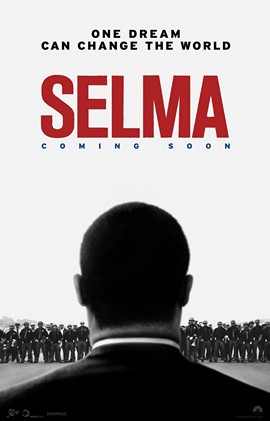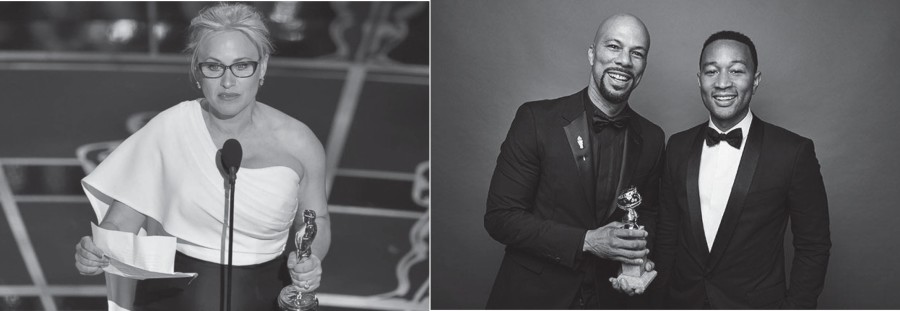After watching “Selma,” it is easy to see and understand that this movie was filled with a vast amount of emotion and impact. Despite being overlooked by members of the Academy, “Selma,” directed by Ava DuVernay, still sends a powerful message on a past event that is relatively vague to the average citizen.
With “Selma” recently coming out and Martin Luther King Jr.’s birthday this past week, I found it appropriate to discuss the rigors and turmoil that he, as well as Ralph Abernathy and a plethora of other civil rights activists, had to endure throughout the 1960s, specifically 1965. Considering it was 50 years ago, looking at where we stand as a country today in comparison to 1965 is paramount (No pun intended, really).
“Selma” accurately depicted the climate of the early 1960s from those who were beaten, verbally abused and tortured. The film also sheds light on March 1965, the year President Lyndon B. Johnson (Tom Wilkinson), approved the Voting Rights Act for African-American men and women. David Oyelowo, starring as Martin Luther King Jr., evoked the same passion and emotion MLK displayed to millions across the world. Viewers who see the film will receive insight into how MLK went about conquering inequality in America through Oyelowo’s ability to capture MLK’s dream of obtaining voting rights by setting foot in Selma. Particularly for younger audiences, the authentic nature of Oyelowo and his ability to resonate with movie-goers provides a blueprint on how MLK carried himself.
Oyelowo’s role seemed genuine and made the movie exhilarating to watch. Carmen Ejogo, who plays Coretta Scott-King, evoked compassion and love for MLK, despite the constant manipulation from county sheriffs and others looking to stop the movement. Likewise, Ejogo showed Coretta Scott-King’s inner-courage during the march in Selma as she immersed herself into the debilitating situation. Oprah Winfrey (Annie Lee Cooper), Wendell Pierce (the Rev. Hosea Williams), Omar J. Dorsey (James Orange), Common (James Bevel) and a host of other actors all make you feel a part of the historic journey from Selma to Montgomery.
As someone who has been to Selma, Ala., and walked the well-known Edmund Pettis Bridge, as well as someone who understands the power behind MLK’s struggle to acquire voting rights, I found the movement to be extremely realistic within the film. Walking the streets of Selma gave me a new appreciation for the people who died trying to acquire their voting rights and “Selma” sheds an intriguing light on the impact people had on Alabama and America. A prime example of courage came from Boston clergymen James Reed (Jeremy Strong), who was martyred in Selma on March 11, 1965 after driving from Boston. Jimmie Lee Jackson (Keith Stanfield), who was murdered by a police officer on Feb. 18, 1965 in Selma, also serves as a brave leader showcased in the film. These two names are not as recognizable in today’s society, but capturing the deaths of both men highlights the importance of acknowledging historical events and leaders that sometimes go unnoticed.
As an avid lover of film, the constant drama and harassment was tough to watch. However, the brutality involved in “Selma” was a riveting aspect of the film by serving as an authentic representation of what occurred in the South, and what is happening today. Hearing and reading about the march in Selma and struggle for voting rights is one aspect, but seeing this movie gives people visual evidence of how vicious the police force and citizens were to MLK and his non-violent followers.
Although “Selma” was filled with numerous actors with varying acting talent, the film does an excellent job of carefully following the famous march from Selma to Montgomery despite the talent. Logging key points throughout the movie was a smart tactic that helps the viewer stay updated and alert throughout the film. That said, using race as a caveat in films can be risky, but DuVernay uses race relations to illuminate the dissonance and cohesiveness of the people in Alabama and America as a whole. The pragmatic, cold, yet informative nature of “Selma” adds a dimension that is unlike historical movies that have premiered in the past, which is key when trying to express a realistic representation.
“Selma” also provides a carefully-constructed framework for today’s society in regards to civil rights, race and the overall racial climate of America. Race is definitely one of the most highly-debated topics in our country, and many of the injustices in Selma were extremely similar to what is happening throughout America today. With hundreds of thousands of homicide and murder cases every year, it was hard to refrain from becoming emotional about the trials and tribulations King and his followers endured during the early 1960s. Yes, the impact of “Selma” can be felt because it is about race, which is still a huge issue 50 years later. But, it provides another reminder that color should not matter in the grand scheme of things. People of all races came together in Selma, and they showed the world that uniting was possible—even in a small town in the middle of Alabama. Trying to make sense of civil rights and race relations can be difficult to understand, but every cast member involved in “Selma“ depicted a wide array of emotions to convey how painful t it was to walk the bridge in Selma, and accept the brutality that came at them constantly. They say history repeats itself, and Selma is a perfect example of how America has plenty of room for improvement regarding racism and inequality.
Despite receiving very few Oscar nominations, awards or accolades, Ava DuVernay, along with the cast members, proved justice was definitely served in “Selma.”





